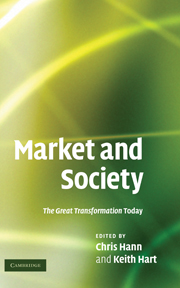Book contents
- Frontmatter
- Contents
- List of figures and table
- List of contributors
- 1 Introduction: Learning from Polanyi 1
- 2 Necessity or contingency: Mutuality and market
- 3 The great transformation of embeddedness: Karl Polanyi and the new economic sociology
- 4 The critique of the economic point of view: Karl Polanyi and the Durkheimians
- 5 Toward an alternative economy: Reconsidering the market, money, and value
- 6 Money in the making of world society
- 7 Debt, violence, and impersonal markets: Polanyian meditations
- 8 Whatever happened to householding?
- 9 Contesting The Great Transformation: Work in comparative perspective
- 10 “Sociological Marxism” in central India: Polanyi, Gramsci, and the case of the unions
- 11 Composites, fictions, and risk: toward an ethnography of price
- 12 Illusions of freedom: Polanyi and the third sector
- 13 Market and economy in environmental conservation in Jamaica
- 14 Embedded socialism? Land, labor, and money in eastern Xinjiang
- 15 Afterword: Learning from Polanyi 2
- Bibliography
- Index
1 - Introduction: Learning from Polanyi 1
Published online by Cambridge University Press: 08 August 2009
- Frontmatter
- Contents
- List of figures and table
- List of contributors
- 1 Introduction: Learning from Polanyi 1
- 2 Necessity or contingency: Mutuality and market
- 3 The great transformation of embeddedness: Karl Polanyi and the new economic sociology
- 4 The critique of the economic point of view: Karl Polanyi and the Durkheimians
- 5 Toward an alternative economy: Reconsidering the market, money, and value
- 6 Money in the making of world society
- 7 Debt, violence, and impersonal markets: Polanyian meditations
- 8 Whatever happened to householding?
- 9 Contesting The Great Transformation: Work in comparative perspective
- 10 “Sociological Marxism” in central India: Polanyi, Gramsci, and the case of the unions
- 11 Composites, fictions, and risk: toward an ethnography of price
- 12 Illusions of freedom: Polanyi and the third sector
- 13 Market and economy in environmental conservation in Jamaica
- 14 Embedded socialism? Land, labor, and money in eastern Xinjiang
- 15 Afterword: Learning from Polanyi 2
- Bibliography
- Index
Summary
Market and society
Markets are networks constituted by acts of buying and selling, usually through the medium of money. For most of history they were kept marginal to the mainstream institutions on which societies were built. But not long ago, and at first only in some parts of the world, markets came to be accepted as central to society, leading to a vigorous political debate, which is ongoing, about the appropriate relationship between the two. It is widely acknowledged that the publication of Adam Smith's The Wealth of Nations in 1776 provided a charter for “the market” (now often singular) to assume its place as the dominant institution of modern societies. The idea of economy, which started out as a principle of rural household management, now became closely identified with markets, as did the profession of economics which grew up to study them. One man, however, made the modern history of the relationship between market and society his special concern: Karl Polanyi (1886–1964), whose The Great Transformation, published during the Second World War, remains the most powerful indictment of what he considered to be the utopian and ultimately destructive attempt to build society on the basis of self-regulating markets. Our authors therefore consider the relevance of this Central European polymath for their work.
- Type
- Chapter
- Information
- Market and SocietyThe Great Transformation Today, pp. 1 - 16Publisher: Cambridge University PressPrint publication year: 2009
- 19
- Cited by

